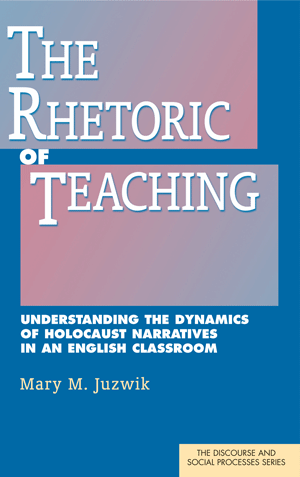The Rhetoric of Teaching: Understanding the Dynamics of Holocaust Narratives in an English Classroom | |
|  | Quantity in Basket:none
Code: 978-1-57273-846-4
Price:$47.50
Title: The Rhetoric of Teaching
Sub-title: Understanding the Dynamics of Holocaust Narratives in an English Classroom
Author(s): Mary M. Juzwik
Publish Date: August 2009
Pages: 212
Format: Cloth
| |
| This volume examines the nature and influence of oral teacher narratives in a single instructional unit. The analyses focus on narrative data that the author generated during a 6-week thematic unit that was taught by a third year teacher in a public middle school. The topic of the Holocaust was chosen because it was well suited for the exploration of oral narrative; the author examines how one teacher rhetorically shaped “knowing about the Holocaust” in her language arts classroom.
Because teaching is analyzed through a rhetorical lens, the book is situated at the intersection of classroom discourse studies, rhetoric and composition, and sociolinguistic approaches to narrative.
Contents: Understanding a Rhetoric of Teaching: An Introduction. Towards a Rhetoric of Teaching: Theorizing Narratives in Classroom Discourse. A Framework for Rhetorical Analysis. Interpersonal, Expressive, and Referential Dimensions of Oral Teacher Narrative. Plan of the Book. Project Site and Participants. Enacted Holocaust Curriculum and the Emergence of Oral Narrative Events. From Curriculum Intended to Curriculum Enacted. The Emergence of Oral Narrative Events in Jane’s Holocaust Unit. Conclusion. Oral Narratives as Textual Tools for Teaching about the Holocaust and the Second World War: A Referential Analysis. Why Teach About the Holocaust? Commemorating, Identifying, and Moral Stance-Taking. Conclusion. Performing Ethos: The Interpersonal Work of Narrative. A Conceptual Landscape for Understanding Narrative Ethos. Narrative and Non-Narrative Frame Spaces. Constructed Dialogue and the Animation of History. Evaluation. Conclusion. The Expressive Texture of Oral Narrative in Teaching. Oral Narrative Style and Identification. Text. The Pedagogical Influence of Narrative Identification. Conclusion. Ethical Considerations in Using Oral Narratives to Teach about the Holocaust. Potential Benefits. Potential Dangers. Conclusion. Teacher Rhetoric and the Moral Imagination. Studying the Rhetoric of Teaching. Imagining Practice as Rhetoric and Rhetoric as Practice. Conclusion. Appendices. References. Author Index. Subject Index. |
| |







